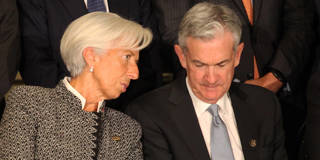The European Central Bank and the US Federal Reserve’s new monetary-policy strategies now look like a case of adapting the general staff manual to fight the last war. The recent sharp increase in inflation on both sides of the Atlantic means that central bankers must again concentrate on their traditional task.
BRUSSELS – In recent decades, central bankers’ job had become somewhat boring and frustrating. They were given independence in the 1990s, because that seemed the best way to ensure price stability. The prevailing view (then) was that leaving governments in control of monetary policy would result in economic stimulus that ultimately fueled higher inflation without any appreciable increase in output or employment. The solution was to appoint prudent technocrats whose only task would be to set and adhere to an inflation target.
In one sense, this approach was too successful. Inflation remained subdued for 20 years, and especially after the global financial crisis – an episode that taught central bankers the hard way about the vital importance of financial stability. Price growth did not decelerate by much, even as the economy tanked in 2009 (the so-called “missing deflation puzzle”), and remained low when the recovery slowly gained steam and led to full employment. During these two decades, inflation hovered in a narrow corridor around 2% in the United States, between 1-2% in the eurozone, and below 1% in Japan.
Of course, central banks claimed that this low and stable inflation was the result of their skillful monetary policy, despite the handicap of being unable to push interest rates much below zero. But for an outsider, it remains puzzling as to why, for example, the European Central Bank could not achieve its previous inflation target of “below, but close to, 2% over the medium term,” despite implementing a bond-buying program worth trillions of euros.

BRUSSELS – In recent decades, central bankers’ job had become somewhat boring and frustrating. They were given independence in the 1990s, because that seemed the best way to ensure price stability. The prevailing view (then) was that leaving governments in control of monetary policy would result in economic stimulus that ultimately fueled higher inflation without any appreciable increase in output or employment. The solution was to appoint prudent technocrats whose only task would be to set and adhere to an inflation target.
In one sense, this approach was too successful. Inflation remained subdued for 20 years, and especially after the global financial crisis – an episode that taught central bankers the hard way about the vital importance of financial stability. Price growth did not decelerate by much, even as the economy tanked in 2009 (the so-called “missing deflation puzzle”), and remained low when the recovery slowly gained steam and led to full employment. During these two decades, inflation hovered in a narrow corridor around 2% in the United States, between 1-2% in the eurozone, and below 1% in Japan.
Of course, central banks claimed that this low and stable inflation was the result of their skillful monetary policy, despite the handicap of being unable to push interest rates much below zero. But for an outsider, it remains puzzling as to why, for example, the European Central Bank could not achieve its previous inflation target of “below, but close to, 2% over the medium term,” despite implementing a bond-buying program worth trillions of euros.